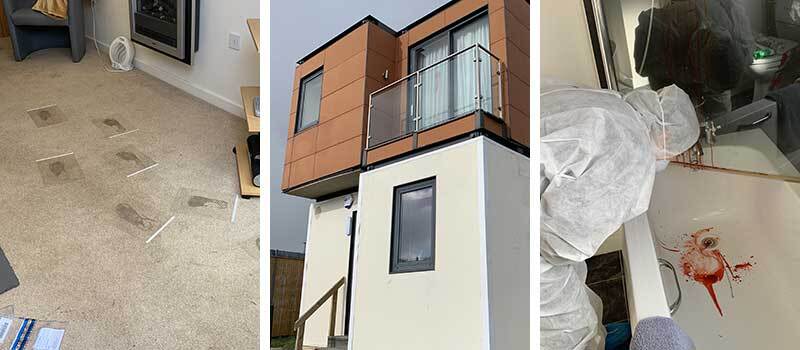BSc (Hons) Forensic Science Degree (Level 6) — Full-time

Course outline
This exciting new Level 6 Bachelor of Science (Honours) degree introduces the world of the forensic scientist and crime scene investigator as well as the practical science skills required to become a practicing forensic analyst.
These include forensic biology and analytical chemistry together with an introduction to the criminal justice system within which many forensic scientists work.
New science facilities now open
This course is based at our new £58 million City Hub campus, next to Nottingham train station which boasts:
- A brand new £1.2m science and innovation centre which opened in September 2022, offering purpose-built higher level technical facilities for students studying in the fields of biology, chemistry, forensics, pharmaceuticals and dental technologies.
- For Forensic Science students, bespoke ‘crime scene houses’, a blood spatter room and state-of-the-art finger print analysis equipment.
- A suite of brand new industrial grade machinery and equipment, including a bench-top NMR scanner, a high performance liquid chromatogram, UV, IR and Mass spectrometers

The course delivers modules in the methods of forensic analysis and the role of forensic science in modern society.
You’ll develop knowledge and understanding of forensic science theories and practice to be able to apply them in a variety of situations and contexts.
Modules include:
Year 1 (Level 4) indicative modules:
- Introduction to Forensic Biology
- Introduction to Forensic Chemistry
- Introduction to Crime Scene Investigation and Photography
- Professional, Research, and Quantitative Skills
- The Legal System, Criminal Justice, and the Expert Witness
Year 2 (Level 5) indicative modules:
- Advanced Forensic Biology
- Analytical Forensic Chemistry
- Advanced Crime Scene Investigation and Management
- Forensic Analysis of Evidence 1
- Bloodstain Pattern Analysis
- Research Methods and Skills
Year 3 (Level 6) indicative modules:
- Independent Research Project
- Forensic Analysis of Evidence 2
- Fire Investigation
- Interpretation, Evaluation, and Presentation of Evidence
- Contemporary Issues in Forensic Science
Useful links:
- Programme Specification
- Open University Students Guide 2023-24
- Open University Validation Regulations 2023-24
Nottingham College is proud to have been awarded the Teaching Excellence Framework Bronze Award for high quality student experience and outcomes. You can read more about this on the Office for Students website.
How to apply for this course
Entry onto this course is via UCAS.
- Institution code: N30
- UCAS code: FOR3

Location:
111 Canal Street
Nottingham NG1 7HB |
Date:Start: Monday 23rd September 2024 |
Fees / reductions:The tuition fee is per year. Various bursaries are available for some Higher Education courses. Tuition fee: £8,250 |
|
Course code: C043307 / Q043309 |
||
| Qualification | Bachelor of Science (Honours) in Forensic Science validated by The Open University. |
|---|---|
| Duration | 3 years |
| Level | Level 6 |
| Entry requirements | Applicants should possess (or expect to achieve) a full Level 3 science qualification or two A level science passes – preferably Biology and Chemistry. GCSE English Language and Maths passes at Grades 9 to 4 (previously A* to C) are required. As an equivalent, we expect applicants to be working at (or to demonstrate competency at) Level 2 or above in English/literacy and Maths/numeracy. Applicants must have a minimum of 48 UCAS points from:
Other combinations of qualifications and experience will also be considered, as will Level 3 qualifications not currently listed on the UCAS tariff. Mature applicants not meeting the standard entry criteria but with relevant industry or life experience are very welcome to apply. |
| Teaching & assessment | Units are assessed via a range of internally set and assessed assignments including: reports, case studies, oral presentations, practical assessments, crime scene assessments, mock court assessments, individual project work, data analysis, research, investigation, problem-solving tasks and portfolios of evidence. |
| Progression | This is a versatile degree providing an excellent basis for future careers. Graduates will be well-placed for employment in a wide variety of fields, such as governmental agencies, forensic investigation, policing, quality assurance in food and pharmaceutical manufacturing, laboratory analysis, chemical and biological research and teaching. Specific roles include: forensic scientist, ballistic expert, DNA analyst, toxicologist, biomedical scientist or analytical chemist. |
| Additional information | 
You can view the Open University Students Guide 2022 here. In addition, you can view the OU Validated Award Regulations here. |
Biology Lecturer Nicola tells us all about our specialist Microbiology Lab
Our City Hub campus is home to over £1.2m of specialist science facilities. We hear from Biology Lecturer Nicola who tells us all about how our industry standard facilities, like our microbiology lab, as well as our experienced teaching and technician teams mean we are able to offer specialist courses.




